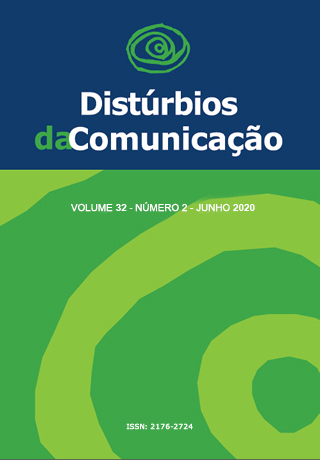Lexical performance and regional differences in expressive vocabulary of schoolchildren aged between 3 to 6 years old of a public school in the Northeast
DOI:
https://doi.org/10.23925/2176-2724.2020v32i2p215-224Keywords:
Vocabulary, Language tests, Child, Language, Language development.Abstract
Objective: To describe lexical performance and to characterize the regional differences in the vocabulary of children from a region of the country that does not have reference values for the vocabulary test. Methods: The corpus of this research was made up of one hundred children between 3 and 6 years old, assessed through the Child Language Test - Vocabulary Test. The evaluations were recorded and the data were transcribed orthographically. Mann-Whitney tests were applied for comparisons between genders and Kruskal-Wallis for comparison between age groups and classes, the ANOVA one-way test to compare the usual verbal designation between age groups and the T test - single sample for comparisons between the usual verbal designation means obtained and the percentage expected by the test, finally, a descriptive analysis was performed for the vocabulary. Results: There was a significant difference in the performance of the means of usual verbal Designation and Substitution Processes between classes and age groups. Among the semantic categories, clothing and places were more prone to variation. Animals was considered the best category. Among the semantic categories, places presented all the words with the usual verbal designation below. Conclusion: The children presented different performances according to the age group and school class, but similar in terms of gender. There was a high number of lexical variations, demonstrating the need for tests that contemplate the sociolinguistic and cultural diversity existing in the country.Downloads
Downloads
Published
Issue
Section
License
Copyright (c) 2020 Antonio Lucas Ferreira Feitosa, Andresa Mayra da Silva Melo, Maria Érika dos Santos de Araújo, Gabriella Silvino dos Santos, Thais Nobre Uchôa Souza, Priscila Rufino da Silva Costa

This work is licensed under a Creative Commons Attribution 4.0 International License.









